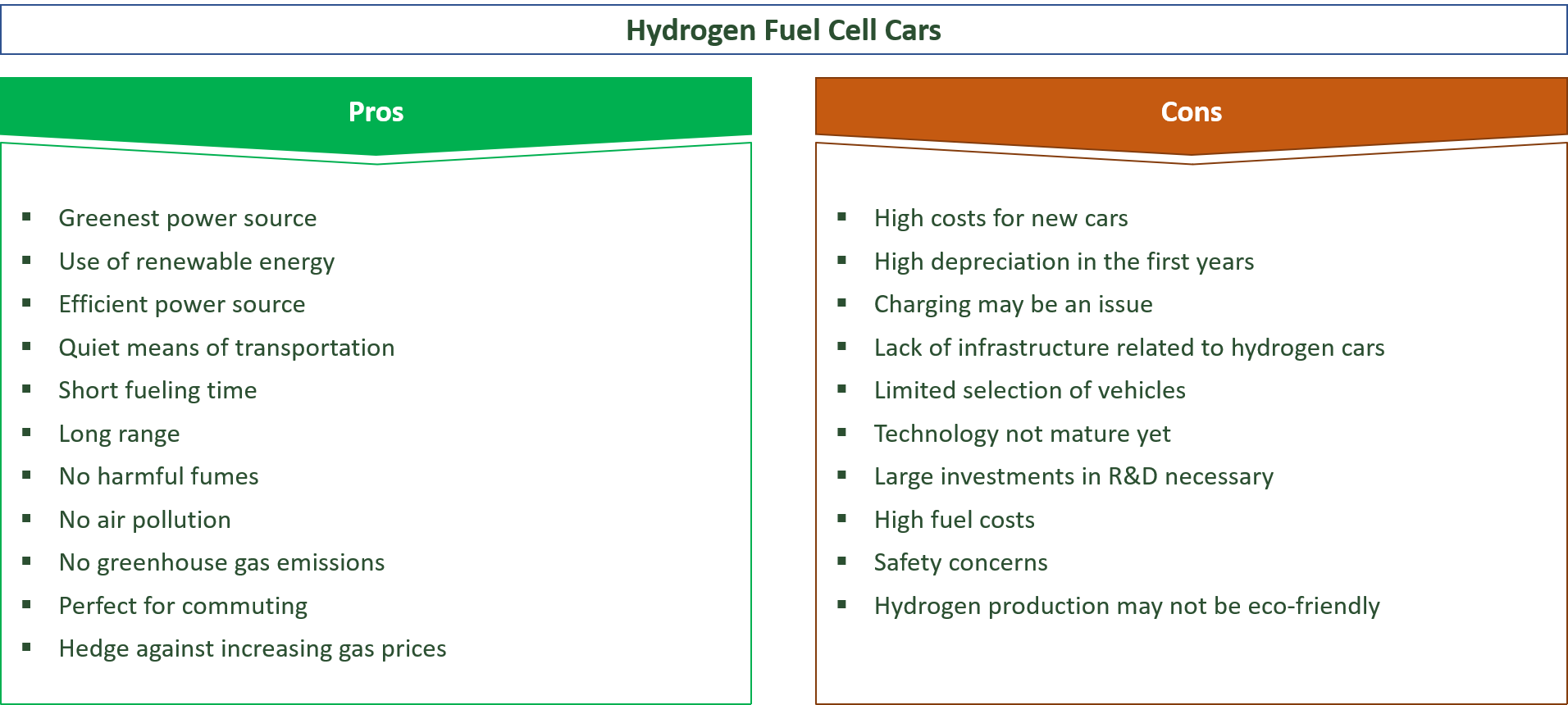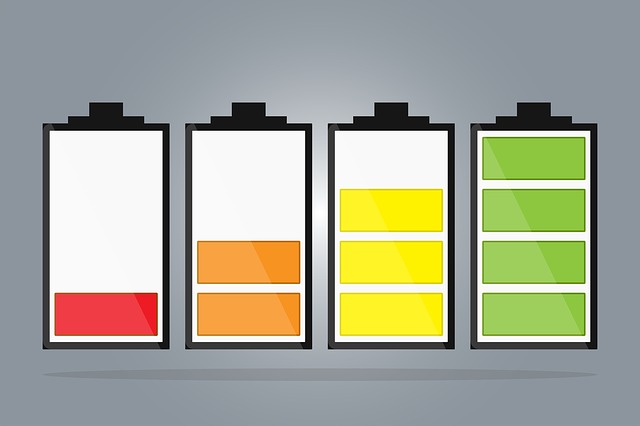“I was encouraged to hear that GM has made great progress on the hydrogen car.”
Albert Wynn, Politician
Pros and Cons of Hydrogen Fuel Cell Cars

Hydrogen fuel cell cars are vehicles that use hydrogen fuel instead of conventional fuels like gas.
While hydrogen fuels are often used for rockets, they also become more popular in the context of automobiles.
Compared to conventional cars that use fossil fuels, fuel cell cars have many advantages.
However, they also have some shortcomings.
In this article, the pros and cons of hydrogen fuel cell cars are examined.
Audio Lesson
Contents
Pros of Hydrogen Fuel Cell Cars
- Greenest power source
- Use of renewable energy
- Efficient power source
- Quiet means of transportation
- Short fueling time
- Long range
- No harmful fumes
- No air pollution
- No greenhouse gas emissions
- Perfect for commuting
- Hedge against increasing gas prices
Greenest power source
Hydrogen fuel cells are considered to be the greenest power source among alternative energies that is currently known to humanity.
Since hydrogen fuel can be produced without the use of fossil fuels, it does not have all the problems related to the use of conventional cars.
Thus, especially in the context of the transition from fossil to renewable energies, hydrogen cars may play a crucial role in the next decades and may also become a suitable alternative to electric vehicles.
Use of renewable energy
Since hydrogen fuel can be produced out of water through electrolysis, it is fully renewable energy since water has been on our planet before the first human existed and will be there once humanity becomes extinct.
Thus, even though water may become a scarcer resource in the future due to global warming, there will still be enough water left to carry out the production process of hydrogen fuel.
Therefore, hydrogen power is a reliable power source that could supply humanity with large amounts of green energy.
Efficient power source
Hydrogen fuel can also be regarded to be a quite efficient power source.
Since the process behind the production of hydrogen fuels is quite simple, a high fraction of the energy that is produced through electrolysis can be stored and used for several purposes, including for the fueling of hydrogen cars.
Quiet means of transportation
Compared to conventional cars that are fueled by gas or other fossil resources, hydrogen fuel cell cars are rather quiet.
In fact, hydrogen cars do hardly produce any sounds at all, similar to electric vehicles.
Thus, in big cities where the noise pollution from cars is quite high, switching from conventional to hydrogen cars might be a pretty good idea to lower the overall noise level since excessive noise can lead to serious mental health conditions for many people.
Short fueling time
Similar to conventional cars, fuel cell cars also have a quite short fueling time.
It only takes a few minutes until a hydrogen car will be refueled.
Compared to electric cars for which it can take up to 30 minutes to fuel, you could save plenty of time by using fuel cell cars instead.
Thus, also in terms of fuel time, hydrogen cars are in pretty good shape compared to the alternatives in the automobile market.
Long range
Another advantage of hydrogen fuel cell cars is that they have a pretty long range.
In fact, hydrogen cars will often be able to reach 300 miles until they have to be refueled.
This is quite similar to the range of an average car that is powered by gas.
However, it is much longer compared to alternatives like electric cars which will only be able to make around 150 miles on average until they have to be fueled again.
No harmful fumes
Hydrogen cars also do not emit any harmful fumes at all. In fact, like electric cars, they will not emit any fumes at all.
This is a big advantage over conventional cars that emit large amounts of harmful gases into our atmosphere.
These gases do not only contribute to global warming, they can also be pretty harmful to human health.
Especially in areas with high levels of smog, air and particle pollution, the fumes from cars can lead to serious pulmonary diseases or also to heart conditions of several sorts.
Thus, also from a health standpoint, hydrogen fuel cell cars may be preferred over the use of conventional cars.
No air pollution
Apart from fumes, there is also no air pollution from hydrogen fuel cell cars at all.
Conventional cars emit gases that contribute to ozone layer depletion and also to the development of acid rain.
Thus, there are many issues to the use of conventional gas that use fossil fuels which could be avoided by using hydrogen cars instead.
No greenhouse gas emissions
Another big upside of hydrogen cars is that they do not emit harmful greenhouse gases into our atmosphere.
As we all know, the emission of greenhouse gases contributes to global warming and the implied horrible effects for millions of people worldwide.
Therefore, by using fuel cell cars instead of conventional ones, we as humanity could mitigate the emission of greenhouse gases and slow down global warming to a certain extent.
Perfect for commuting
Since it is crucial that we improve the air quality in big cities, hydrogen cars may be a good alternative to the use of conventional cars, especially for commuting purposes.
The average person spends plenty of time in traffic jams over the course of his or her life, which also implies the emission or large amounts of harmful gases into our atmosphere if those people use conventional cars.
By switching to hydrogen cars, emission levels in cities could be reduced significantly.
Hedge against increasing gas prices
If you still use conventional cars that are powered by fossil fuels in the future, you might also suffer from significant increases in gas prices.
Since fossil fuels are finite resources, they may become scarcer over time.
Since the price of goods will usually be determined by supply and demand, chances are that the price for fossil resources will increases due to the higher level of scarcity over time.
Therefore, now may be a good time to switch from conventional to hydrogen cars in order to become independent of fossil fuel prices.

Cons of Hydrogen Fuel Cell Cars
- High costs for new cars
- High depreciation
- Charging may be an issue
- Lack of infrastructure related to hydrogen cars
- Limited selection of vehicles
- Technology not mature yet
- Large investments in R&D necessary
- High fuel costs
- Safety concerns
- Hydrogen production may not be eco-friendly
High costs for new cars
One major disadvantage of hydrogen fuel cars is that they are pretty expensive.
New hydrogen cars are usually sold much higher compared to conventional cars.
Also, electric cars are usually much cheaper.
Therefore, from an economic standpoint, hydrogen cars are not yet an investment case.
However, this may change over time due to our rapid technological progress.
It is quite possible that fuel cell cars may become significantly cheaper in the near future.
High depreciation
Not only the initial purchase price for hydrogen cars is quite high, also the depreciation rate should be considered.
Even though also conventional cars have a pretty high depreciation rate and vehicles lose plenty of value in the first few years, the depreciation of hydrogen vehicles might be even higher.
However, since the market for hydrogen cars is rather small, valid conclusions about the real depreciation rate of hydrogen cars may not be possible at this point in time.
Charging may be an issue
Since hydrogen power is rather new and many car companies do not engage in this power source yet, there are serious charging issues related to the use of hydrogen cars.
For instance, depending on your living area, you will have a pretty hard time finding a suitable fuel station that provides you with hydrogen fuel.
In fact, for most regions, there will be no suitable fuel stations around in a radius of 100 miles.
This implies that you will be pretty confined in the use of your hydrogen car since you might simply run out of fuel on a regular basis if you do not pay close attention regarding fuel opportunities.
Lack of infrastructure related to hydrogen cars
The overall infrastructure around fuel cell cars is pretty confined.
Apart from a lack of fuel stations, there is also a lack of knowledge when it comes to repairs and maintenance in many car repair shops since most mechanics are not yet familiar with this rather new technology.
Therefore, you may also have a hard time finding someone who will be able to fix your car issues in case you have trouble with your hydrogen engine.
Limited selection of vehicles
Another issue with hydrogen cars is that the selection of fuel cell cars is pretty confined.
While for conventional cars, you can choose a myriad of different types and models, only a few car companies engage in the hydrogen car market.
Therefore, you would have to make compromises when it comes to buying a hydrogen car.
Technology not mature yet
Since the technology of hydrogen power is rather new and not many car companies engage in that market at the current point in time, the risk for breakdowns or other issues related to hydrogen cars might be significantly higher compared to conventional cars since cars that are powered by fossil fuels have been used for many decades and there is much more experience in this field compared to the hydrogen car industry.
Thus, by buying a fuel cell car, you should take into account that it might be more vulnerable to technical issues.
Of course, as time passes and technology moves forward, the issues related to hydrogen cars may be solved and fuel cell cars might become much more reliable over time.
Large investments in R&D necessary
Since the technology behind hydrogen cars is not mature yet, this kind of technology requires large financial investments for research and development in order to improve processes and to make hydrogen cars much more cost-efficient.
Only then will hydrogen cars become a suitable alternative to conventional or also to electric cars in the near future.
High fuel costs
Another problem with hydrogen cars is that apart from the high purchase prices, also the prices of hydrogen fuels are much higher than those of conventional fuels like gas.
The average hydrogen fuel price for energy that is equivalent to one gallon of gas currently is around 5.50 USD, while the average gallon of gas costs around 2,50 USD.
Thus, hydrogen fuel is more than twice as costly when it comes to fuel expenses.
Therefore, at our current point in time, hydrogen cars may be suitable for people who earn pretty good money, but are rather unattractive for people with an average income since hydrogen fuel prices are just too expensive.
However, experts estimate that hydrogen fuel prices may decrease significantly in the near future, which may make fuel cell cars more attractive to the general public.
Safety concerns
Since the technology behind fuel cell cars is not mature yet, there may also be some safety concerns.
Even though from an objective standpoint, there should not be too many accidents from hydrogen technology, people may fear this kind of technology and may rather refrain from buying hydrogen cars since they are simply unfamiliar with the technology and may be insecure about the safety standards.
Hydrogen production may not be eco-friendly
Even though hydrogen fuel can be produced in an entirely green manner through the electrolysis of water, at our current point in time, fossil fuels are still used in the production chain of hydrogen power.
In order to make hydrogen fuel cell cars environmentally-friendly, the energy that is used for hydrogen fuel production has to be produced with green technologies.

Top 10 Hydrogen Cars Pros & Cons – Summary List
| Hydrogen Car Pros | Hydrogen Car Cons |
|---|---|
| Greener compared to conventional cars | High purchase price |
| Use of renewable resources | High depreciation |
| Efficient power | Charging issues |
| No noise pollution | Lack of infrastructure |
| Short fueling time | Limited selection of cars |
| Long range | Technology not mature yet |
| Absence of fumes | Large investments for R&D necessary |
| No air pollution | Hydrogen fuel is quite expensive |
| Less greenhouse gas emissions | Safety issues |
| Suitable alternative for commuting | Not entirely green yet |
Conclusion
Hydrogen fuel cell cars are quite promising vehicles and may have the potential to replace conventional cars at one point in time.
However, since the technology behind hydrogen cars is not mature yet and the necessary infrastructure is missing, it may take a quite long time until fuel cell cars will be a suitable and reliable alternative to conventional cars.
In the meantime, electric cars may be a good alternative to the use of conventional cars.
Sources
https://en.wikipedia.org/wiki/Hydrogen_vehicle
https://www.businessinsider.com/hydrogen-fuel-cell-cars-teslas-biggest-threat-2019-12?r=DE&IR=T
https://cafcp.org/content/cost-refill

About the author
My name is Andreas and my mission is to educate people of all ages about our environmental problems and how everyone can make a contribution to mitigate these issues.
As I went to university and got my Master’s degree in Economics, I did plenty of research in the field of Development Economics.
After finishing university, I traveled around the world. From this time on, I wanted to make a contribution to ensure a livable future for the next generations in every part of our beautiful planet.
Wanna make a contribution to save our environment? Share it!